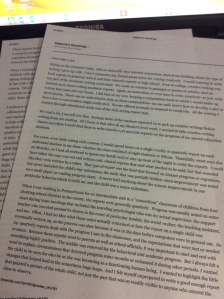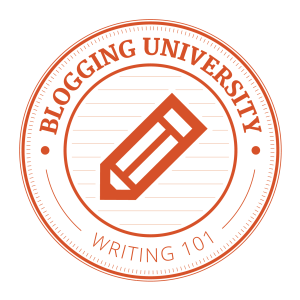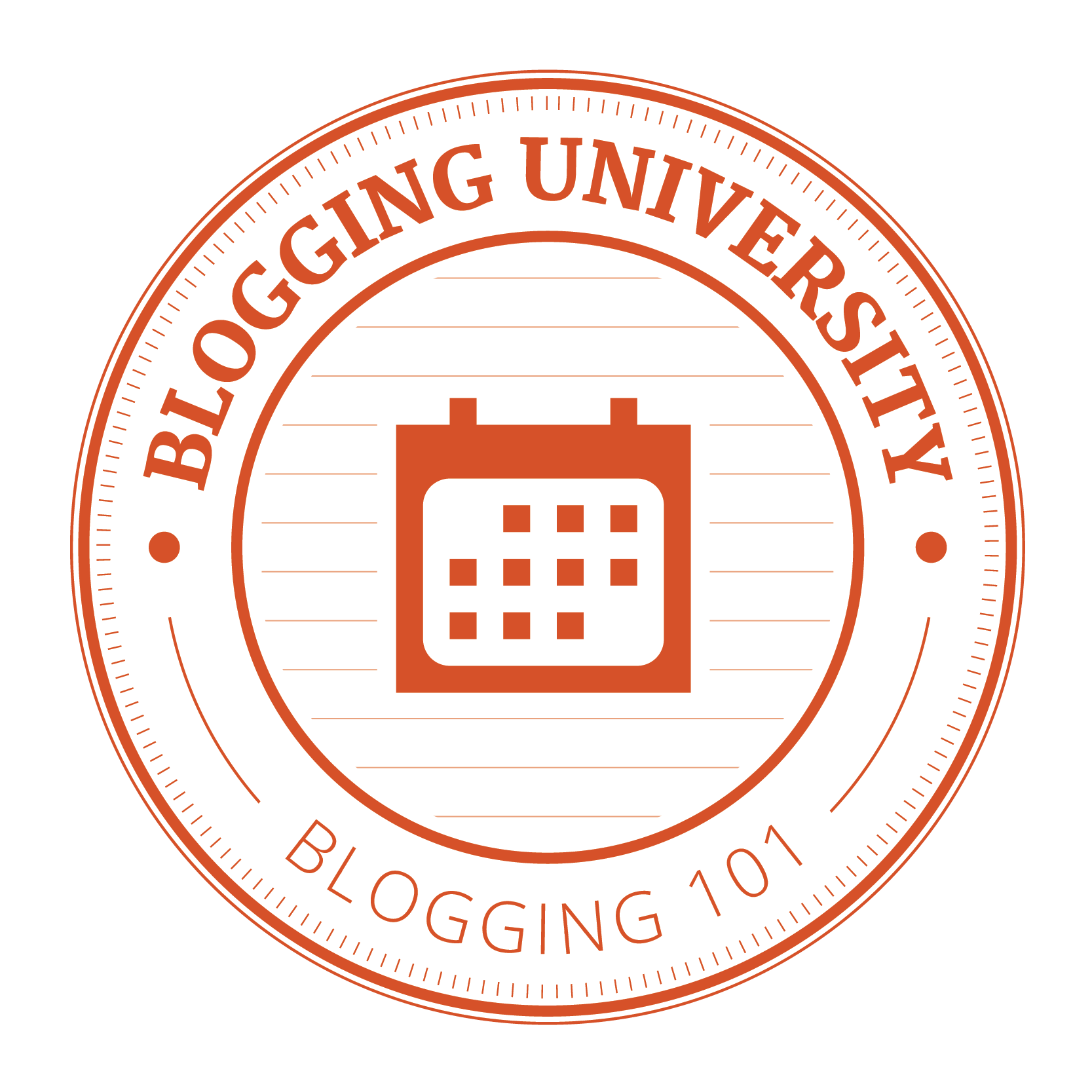Today: First Draft
Sitting on the computer today, with an unusually slow internet connection, started me thinking about the type of writing I grew up with. I don’t remember any formal preparation for writing creatively. I recall learning to write book reports in grammar school, and then research reports in high school. Even in college, creative writing was not part of the freshman writing curriculum. We wrote in reaction to passages or poems or articles, and we learned more about writing academic reports. Again, no instruction or even time to write creatively–to just write a story that came into our heads. I did that on my own, keeping a composition book in which I would make up short stories. There was no authoritative help on these compositions–no one said, here’s how to develop a plot or here’s how a conversation might really start. No one offered prompts to respond to creatively. All the writing I learned through educational study was of the dull, boring report type.
We read a lot, I can tell you that. Perhaps most of the teachers expected us to pick up creative writing/fiction writing from our reading. All I know is that after all my Master’s level work, I needed to take creative writing classes anywhere I could find them to write sensitive yet accurate reports on the progress of my special education students.
For years, even while taking such courses, I would spend hours on a single weekly or quarterly report on each individual student in my class–whether the class consisted of eight students or fifteen. Thankfully, most were due on Monday, so I had all weekend to ignore my family and/or stay up most of the night to write the reports. I could have taken the easy way out and written cold, clinical reports that said what needed to be said, but that sounded like they were written by a robot. That type of report was the kind that focused on blatant progress or regression, but never included the child’s tiny milestones, the smile that was partially hidden when improvement was noted on a math paper or reading progress chart. It never told anything about the minute improvement in one particular behavior which to both me and the child was a major milestone.
When I was working in Pennsylvania for an intermediate unit in a “consortium” classroom of children from four abutting school districts in the county, the reports were generally quarterly. Progress was usually noted on some chart during team meetings that included the traveling psychologist who was my actual supervisor, the support teacher who traveled around to classes in the event of particular trouble, the social worker, the teaching assistant, and me. Often, I had no idea what those notes actually contained or how the report on a single child was eventually written up, as the process was slow because it was in the days before computers were in general use. So my quarterly reports dealt with the progress I saw in the classroom, and the expectations that were met or needed revision. Because these reports went to parents as well as school officials, it was important to start and end with something highly positive. The middle was reserved for the behavioral and academic progress. But I always felt a need to explain circumstances that deterred progress some months or enhanced it during other periods. I wanted the child to be seen for who he or she was becoming as a functioning human being. I wanted to highlight the little changes that helped lead to the sometimes huge leaps. And I felt myself unprepared to write a good enough report that painted a picture of the whole child, not just the part that was so readily visible to anyone who entered the class to observe.
These reports became so difficult and frustrating for me that, after about 10 years, I simply left teaching to become a computer programmer. Interestingly, my time in the special education classes prepared me for working with executives in major US firms, and I almost always was able to read the meaning of what they actually needed between the lines of what they asked for on paper and in conference.
When I returned to teaching special education after ten years in computers, it was to a school that catered to children with much more serious problems so that less progress could be seen in their development. And I started taking writing classes in earnest while also taking courses at the local university to bring my teaching credentials in line with a different state’s requirements. So I was now ten years older and having to write more serious reports. What I discovered was that it was the creative writing classes–the ones I did terribly at in terms of creativity or story-telling ability–that helped me learn how to more quickly and efficiently paint a picture of each child, these reports being written weekly instead of quarterly as in my previous position in a different state.
I sucked at creative writing. And still do. But I am continuing to improve little by little, taking online collaborative classes such as those offered by WordPress’ Blogger U. Each class improves my writing a bit more, and maybe by the time I’m 90, I will finally put together a short story–maybe even a short novel. We’ll see… And to help with the process of genuine critique of my writing, I have started to invite some people who I think have excellent writing potential to participate in a small private workshop to which we can submit some work for positive but honest criticism, or help with plot ideas or continuation, or whatever each of us needs at a given point in time. I have noticed that some people in the Writing 101 class I participated in during April had wonderful potential, but were writing in English in a way that was clearly not their strongest language. I have worked with adult English language learners, and can offer positive assistance in that respect. I have found that I am pretty good at recognizing young adult books that will become major contributions to teen literature–and the Twilight Saga was never in that category, no matter how much money that series earned for the author in book and movie deals. The Hunger Games, on the other hand, or the Harry Potter books I recognized as being top notch from the first book in the series, often long before the critics began to laud the authors’ work. I generally believe I can do that with adult books, too, but there are just too many of them to even begin to “discover.” But I saw enough good writing during the writing class, and received enough feedback when I suggested smaller private writing groups, that I asked WordPress to make one of my blogging sites into a miniature version of the Writing 101 class. They did so, and as of today, there are four people in the group, each of which has all the privileges of the editorial level in a group collaboration for writing improvement.
OK. That was a long and complicated paragraph. If you read it without your eyes glazing over, commend you for making sense out of a lot of words that probably don’t fit together very well. I should probably go back and shorten some sentences, make sure I didn’t say the same thing twice, etc. But I’ll save that for tomorrow or the next time I blog on my writing progress. That way you will be able to see what happens when I stop a “story” from taking over and go back and improve it. After all, what is the sense of sharing how I learn to write if I show you nothing but the finished process?
So next time, I will edit this blog and explain every step that helped me improve it. So stay come back for the next post of how I learn to write.
#educ_dr






This was a very interesting piece of writing. It sounds interesting working in the educational field, and writing certainly is a skill that one is constantly trying to revise and improve on. This was a really informative entry, and I thoroughly enjoyed reading your thoughts. You presented them in a really lovely way. By the way, I thought I would add that you write really well.
Thank you, Lucy.
Lucy, are you interested in joining our small private writer/blogger group at http://www.justmywriting.wordpress.com? I’m keeping the group small so that we can learn to trust each other enough to make honest constructive criticism on works-in-progress. If so, I would be delighted to send you an invitation to the site. So far, we are up to 5, and I don’t want to go over 10. The site was set up by WP for me to look very much like the Writing 101 Commons. We have several English language learners on the site who are great writers nonetheless. I’ve got experience with working with people whose first language is not English. There are also a few English writers on the site–me and one other. Say the word and I’ll send you an invitation. Just send or post your email and your inform me of your interest (dremiller@hotmail.co). You can look at the work I had forgotten I had started a story there several years ago, and got stuck. If you join and don’t know what to post for review, you can always help me out by critiquing a story I started years ago as a YA SF&F piece (OK, I was actually trying for YA novel!). I gave up on it because i think I painted myself into a corner. I don’t know where to go next. Or maybe I should just rewrite that whole “chapter” from scratch.
Let me know if you’d like to become a member. Everyone is granted “editor” status so that we can actually make edits (hopefully annotated) on our submissions. Ellie
Hi Ellie. This sounds like an absolutely fantastic offer. I would love to be invited. I really want to improve my critiquing skills and would love to help you out. I used to write fanfiction for numerous sites so I really love editing and helping out. Lucy
I recognize the feeling of how creative writing prompts improved my non-fictional writing! Although my creative stuff as an answer were still (some what) auto biographic (is that a word in English?) I learned a lot on how much more enjoyable a text becomes by adding styles and forms more natural to fiction. Looking forward to your edited version of your post!
Thanks!
Reblogged this on Eleanore's Ramblings… and commented:
Link Correction